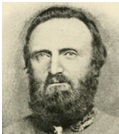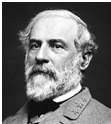|
 |
|
 |
Robert E. Lee Leadership
Robert E. Lee (1807-1870)
Chief of the Confederate army in the American Civil War. After great victories, he (pictured right) eventually lost and surrendered to the larger Union army, led by
Ulysses Grant (pictured right
below). The turning point of the war was Lee's defeat at the Battle of Gettysburg (1863).
For more detail see... The Battle of Gettysburg in the History Highlights section.
Why was he a great leader?
1. Kind but tough Known as the ‘gentleman general’, his main concern was always to serve the needs of his men with humour and compassion. But he was still tough enough to:
2. Great strategist Lee (pictured right in 1838) believed that attack and calculated risks were essential for victory. At the Battle of Chancellorsville (1863), he was outnumbered by two to one but won by boldly splitting up his army and encircling the enemy. At the end of the war, he also defended skilfully with a weak and exhausted army. 3. Support He relied heavily on his generals, particularly Thomas “Stonewall” Jackson (pictured right in 1862) Lee was never as effective after Jackson’s death at Chancellorsville (see point 2), calling him his “right arm”. He avoided conflict, so he led by consensus based on agreement with his senior officers.
4. Trust and empowerment He trusted his men to fight the best they could. They did, because they respected his integrity (see point 5), competence and fairness. He never blamed them for defeat. “I and I alone have lost this battle” he said at the Battle of Gettysburg. 5. Character Deeply influenced by his mother (pictured right), he put duty, virtue, self-control, and honour first. He was gracious in defeat and fought for his home state of Virginia, even though he hated war. “If strife and civil war are to take the place of brotherly love and kindness, I shall mourn for my country”, he said in 1860. He:
6. Religion He was a devout Christian and practised Jesus’s principles of love, forgiveness and humility. He led a simple life, was never arrogant, and always saw himself as equal with his men. His belief in God gave him great serenity during the horrors of war. 7. Consultation Lee (pictured right in 1863) always consulted his generals before making important decisions.
8. Purpose and pursuit of excellence He aimed to serve God by being the best in anything he did. So he was thorough and obsessed about detail in his preparation for battles. He and his men were spurred on by the belief that there would be nothing to live for, if they lost.
9. Learning He learnt from his mistakes. His biggest blunder was ordering a massive and disastrous frontal attack on the enemy at the Battle of Gettysburg by General Pickett ,pictured right, (“Pickett’s Charge”), when 7,500 of his best men died. Lee took full responsibility. “All this has been my fault”, he said.
10. Humour and positive thinking Lee (pictured right in 1867) never took himself too seriously and saw the funny side of life. He also was very positive about life, despite his many failures. He told his son: “All is happy if you make it so”.
Key quotes on ethics and leadership Do your duty in all things. Do not appear to others what you are not. My heart bleeds at every one of our gallant men. We must forgive our enemies.
Key quote on the past It is history that teaches us to hope.
Key quote on war It is well that war is so terrible, otherwise we should grow too fond of it.
Key quote on happiness All is happy if you make it so
|
|
|
||
|
|
|
||
|
||
| Copyright © wisdomtowin.com All Rights Reserved | ||
|









